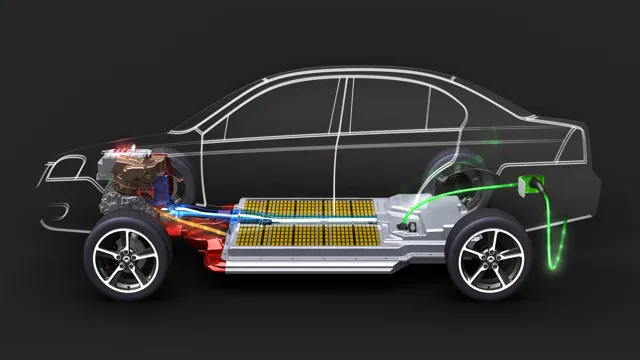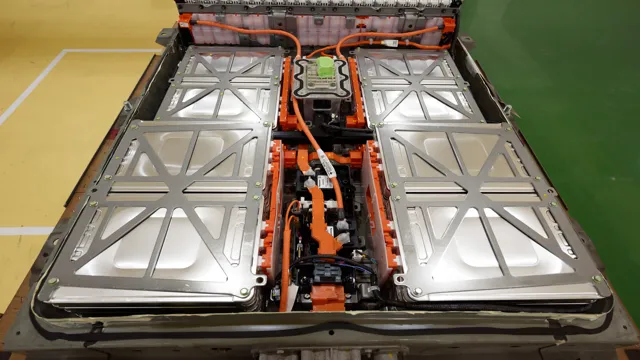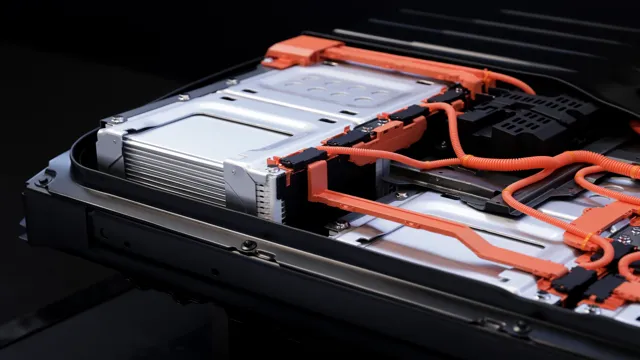Unpacking the Power behind Electric Car Battery Energy Capacity: A Comprehensive Guide
Electric cars are rising in popularity more than ever before for their eco-friendliness. But, one of the biggest challenges with these cars may surprise you: battery life. The amount of energy electric car batteries can hold determines how far the car can go before needing to be recharged.
This energy capacity is essential for making the car more efficient, keeping maintenance costs low, and providing a seamless driving experience. Many car manufacturers are now seeking to increase the battery energy capacity to improve the performance of their vehicles and attract more buyers. In this blog post, we’ll explore the latest technology around electric vehicle batteries and how the industry is working towards a more sustainable and energy-efficient future.
Types of Electric Car Batteries
When it comes to electric car battery energy capacity, there are several types of batteries available in the market. The most common types are Lithium-Ion, Nickel Metal Hydride, and Lead-Acid batteries. Lithium-Ion batteries are the most preferred option because they have the highest energy density, which means they provide more energy for their size and weight.
These batteries are also more efficient and have a longer lifespan compared to other types of batteries. Nickel Metal Hydride batteries have a slightly lower energy density than Lithium-Ion batteries, but they are still widely used in hybrid cars because of their reliability and lower cost. Lastly, Lead-Acid batteries are the oldest and cheapest type of battery, but they are also the heaviest and have the lowest energy density.
Despite their limitations, these batteries are still used in some electric cars because of their affordability and availability. Overall, the choice of electric car battery will depend on a range of factors including cost, weight, energy density, and lifespan.
Lithium-Ion Batteries
Lithium-Ion Batteries Electric cars are becoming more popular by the day, and one essential component in these cars is the battery system. Lithium-ion batteries are the most common type used in electric vehicles due to several reasons, including high energy density, low maintenance, and long lifespan. These batteries are made up of an anode, cathode, and electrolyte.
When the battery is charged, lithium ions move from the cathode to the anode, and when discharged, the opposite occurs. There are different types of lithium-ion batteries, including LFP, NMC, LMO, and NCA, each with its own properties and specifications. For instance, LFP batteries are commonly used in electric buses and grid storage applications, whereas NMC batteries are preferred in passenger vehicles due to their high energy density.
Overall, lithium-ion batteries are a critical component in electric cars, and advancements in technology are continually being made to improve their efficiency and reduce costs.

Nickel-Metal Hydride Batteries
Nickel-Metal Hydride batteries are one of the types of electric car batteries. They are an alternative to the more commonly used Lithium-ion batteries and have been in use since the 1990s. These batteries use a chemical reaction to generate electricity and have a higher energy density than their predecessors, which means they can store more energy in the same amount of space.
Nickel-Metal Hydride batteries are also more environmentally friendly than Lithium-ion batteries as they contain fewer toxic components, making them easier to recycle. However, they have a lower capacity than Lithium-ion batteries and are more sensitive to temperature changes, which can affect their performance. Despite these drawbacks, Nickel-Metal Hydride batteries have proven useful in hybrid cars and some electric vehicles, and continue to be an option for those looking for a greener, more sustainable source of energy for their electric vehicle.
Solid-State Batteries
Solid-State Batteries When it comes to choosing the battery for an electric car, there are several options available. Among these is the solid-state battery, which is gaining popularity due to its various benefits. As the name suggests, this battery uses solid electrodes instead of liquid or gel-like ones found in traditional lithium-ion batteries.
This type of battery has a higher energy density, meaning it can store more energy in a smaller space, which translates to longer driving distances for electric cars. Besides that, solid-state batteries are safer, less prone to leaking, and have a longer lifespan compared to traditional batteries, making them an attractive option for electric car manufacturers. While solid-state batteries are still in the early stages of development, they hold great promise, and we can expect to see more of them in electric cars in the future.
Energy Capacity Comparison
When it comes to electric car battery energy capacity, there are a few factors to consider. Generally speaking, the energy capacity of an electric car battery is measured in kilowatt-hours (kWh). This number can vary depending on the specific make and model of the car, as well as the size of the battery itself.
For example, some smaller electric cars might have a battery with an energy capacity of around 30 kWh, while larger electric SUVs might have batteries with an energy capacity of 80 kWh or more. This energy capacity directly impacts the range of the car, or how far it can travel on a single charge. So, if you’re in the market for an electric car, it’s important to consider not only the size of the car but also the battery capacity and range to make sure it can fit your specific needs.
Tesla Model S
In the world of electric cars, Tesla’s Model S stands out as a top contender with impressive energy capacity. But how does it compare to other vehicles on the market? Well, when it comes to range, the Tesla Model S can go the distance. With a maximum range of 402 miles on a single charge, it surpasses many rivals in the electric car space.
In comparison, the Jaguar I-PACE has a range of 234 miles, while the Audi e-tron can travel up to 222 miles. So, if you’re looking for an electric car with plenty of range, the Tesla Model S may be the way to go. Of course, range isn’t everything, so it’s important to consider factors such as charging speed, cost, and overall performance when making your decision.
But if you’re after an electric vehicle that can go the distance, the Tesla Model S is definitely worth considering.
Nissan Leaf
When it comes to electric vehicles, the energy capacity of the battery is a crucial aspect to consider. The Nissan Leaf, for instance, comes with different battery options, each with varying levels of energy capacity. The base S trim comes with a 40 kWh battery pack, which provides an estimated range of up to 150 miles on a single charge.
Meanwhile, the higher-end SL Plus trim comes with a larger 62 kWh battery pack, which can offer an estimated range of up to 226 miles on a single charge. That’s a significant increase in energy capacity, making it a great option for those who need more range for their daily commutes or longer road trips. However, it’s important to note that the larger battery pack also means a higher price tag.
So, it’s all about finding the balance between your budget and energy requirements. Overall, the Nissan Leaf offers a decent range for its price point and is an excellent electric vehicle option for those looking for an eco-friendly and efficient way to travel.
Chevrolet Bolt
When it comes to energy capacity, the Chevrolet Bolt certainly has some impressive features to offer. You’ll find that this electric vehicle is capable of delivering up to 259 miles on a single charge, making it an ideal option for those who want to drive a little further without compromising on energy efficiency. Of course, if you’re looking for even more power, there are other options out there that might be better suited for your needs.
For example, the Tesla Model S is capable of delivering up to 373 miles on a single charge, making it a great option for those with longer commutes or who simply want a little more peace of mind when it comes to energy capacity. Whether you opt for the Bolt or the Model S, there’s no denying that electric vehicles are becoming more and more popular in today’s eco-conscious society. So why not do your part to help the planet, while also enjoying all the benefits that electric vehicles have to offer?
Factors Affecting Electric Car Battery Energy Capacity
Electric car battery energy capacity is the amount of energy that the battery can store and deliver to the car’s motor. Several different factors can affect the energy capacity, including the size of the battery, the type of battery chemistry, and the way the battery is used and maintained. Generally, larger batteries can store more energy than smaller ones, while newer battery technologies like lithium-ion batteries tend to have higher energy densities than older types of batteries.
Another factor that can affect energy capacity is how the battery is managed and operated. If the battery is frequently discharged to low levels or charged too quickly, it can cause the battery to degrade faster, reducing its overall capacity. On the other hand, proper care and maintenance, such as avoiding extreme temperatures and charging the battery slowly, can help preserve its energy capacity over time.
Overall, the energy capacity of an electric car battery is an essential consideration when choosing a vehicle, and it’s important to understand the different factors that can affect it to get the most out of your electric car.
Temperature
Temperature Electric cars have become an increasingly popular form of transportation, but one of the most pressing issues that drivers face is the fluctuation in the battery’s energy capacity. The temperature of the battery plays a significant role in its energy capacity, with extreme hot or cold weather conditions causing a decrease in energy storage. In cold weather, the battery’s chemical reaction slows down, increasing its internal resistivity, which results in a reduction of the battery’s overall energy capacity.
On the other hand, in hot weather conditions, the battery’s capacity reduces faster due to the higher demand for cooling. This can cause discomfort to electric car drivers during the summer months, affecting the battery’s overall lifespan and reliability. The best strategy to maintaining a healthy battery depends on charging it regularly and at a moderate temperature.
Keeping the battery in a stable temperature environment, above freezing conditions, will also increase its longevity, reliability, and overall performance.
Driving Conditions and Habits
When it comes to electric car battery energy capacity, driving conditions and habits play a significant role. Factors such as extreme temperatures, frequent stop-and-go driving, and high-speed highway driving can all impact the battery’s ability to store and provide energy. Additionally, aggressive acceleration, heavy loads, and use of the air conditioning or heating systems can also decrease a vehicle’s driving range.
On the other hand, gentle acceleration, maintaining a consistent speed, and avoiding harsh braking can help maximize the battery’s performance. It’s important to note that while some of these factors can be controlled, others are simply due to the nature of driving. Therefore, it’s essential to be mindful of your habits and take steps to optimize your electric vehicle’s battery life.
Proper planning, such as selecting specific routes and charging stations, can also help ensure a successful and stress-free driving experience.
Ways to Improve Energy Capacity of Electric Car Batteries
If you own an electric car, you know how important the battery energy capacity is. It determines how far you can travel before needing to recharge, and it affects the acceleration and overall performance of your electric vehicle. Fortunately, there are several ways to improve your electric car battery energy capacity.
You can start by avoiding extreme temperatures, as both freezing cold and scorching heat can reduce your battery’s performance. Additionally, you can use regenerative braking, a feature that helps recharge your battery while driving, by converting the momentum generated by braking into electrical energy. Lastly, you can consider upgrading your battery to a higher capacity model, or even adding an extra battery pack to increase the range of your electric car.
These measures can help you get the most out of your electric car battery, and make your driving experience smoother, more convenient, and more enjoyable.
Conclusion
In conclusion, while the capacity of electric car batteries may not yet surpass that of traditional gasoline engines, their potential for innovation and improvement is electrifying. As technology continues to advance, we can expect these batteries to become more powerful and efficient, ultimately leading to more sustainable transportation options for us all. So let’s charge forward into the future, fueled by the endless possibilities of electric car battery energy capacity!”
FAQs
What is the average capacity of an electric car battery?
The average capacity of an electric car battery is around 60-100 kWh.
How long does it take to fully charge an electric car battery?
The charging time for an electric car battery varies depending on the charging station used. Most public charging stations can fully charge a car battery in 3-8 hours, while home charging can take 8-12 hours.
What is the lifespan of an electric car battery?
The lifespan of an electric car battery depends on several factors such as usage, climate, and maintenance. Generally, the battery can last up to 8-10 years or about 100,000-200,000 miles.
How much energy does an electric car battery consume per mile?
The energy consumption per mile for an electric car battery typically ranges from 0.3-0.5 kWh, depending on the car model and driving conditions.






